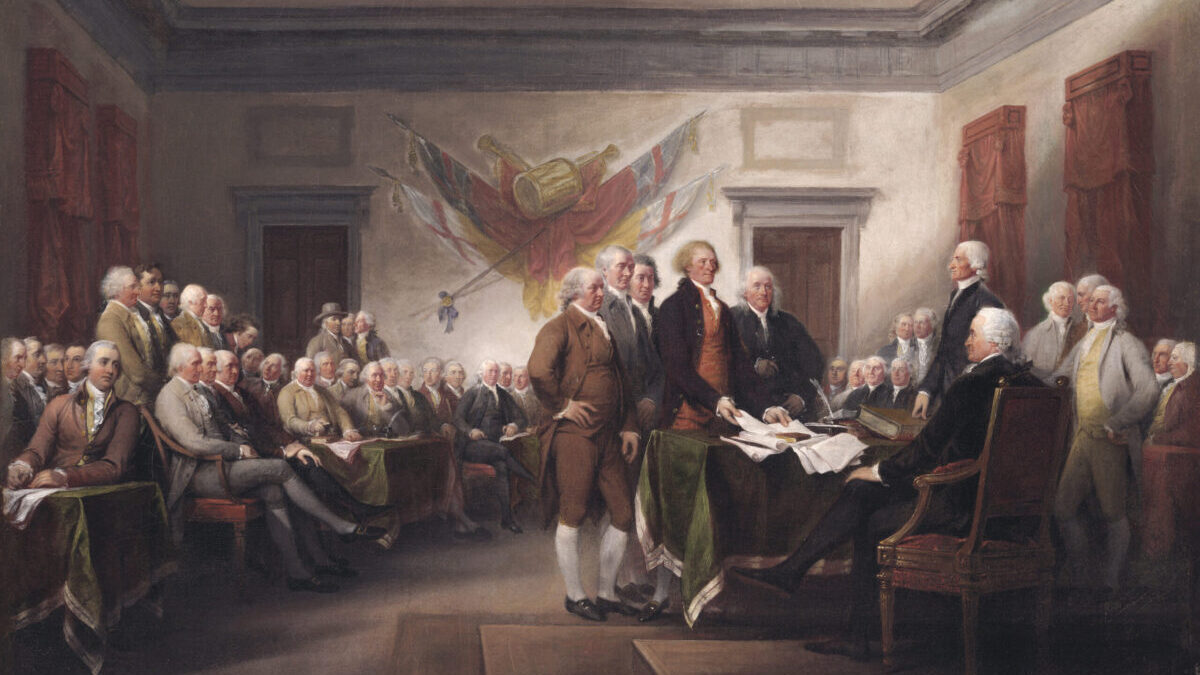When the musical “1776” first opened on Broadway in March 1969, it was greeted enthusiastically by critics and audiences alike.
The Vietnam War and the enormous cultural changes transforming the country in so many ways had already begun to undermine blind faith in traditional attitudes about patriotism. Yet Sherman Edwards and Peter Stone’s comedic musical take on the Continental Congress’ debate about declaring independence was able to tap into audiences’ still-enormous reserve of love of their country and its history. Though few at the time considered it to be a candidate for inclusion among the most beloved Broadway musicals, it has been repeatedly revived (including a not entirely satisfying 1972 film adaptation with many of the original cast) as if it were one.
Still, another Broadway revival in the current atmosphere of toxic contempt for America’s founding myths in the arts world seemed unlikely. In the wake of the 2020 Black Lives Matter riots, “Hamilton” composer Lin-Manuel Miranda found himself forced to apologize for the glorification of white men such as Alexander Hamilton and George Washington, even if they were portrayed by non-whites. A lot has changed since “Hamilton” took the entertainment world by storm when it debuted on Broadway in 2015. The New York Times published its “1619 Project,” which specifically rejected the notion that 1776 was the proper date for America’s beginning and falsely claimed that the Revolutionary War was fought to preserve slavery. Even Miranda’s updating of history has been rendered insufficiently woke by the critical race theory indoctrination spreading throughout schools and corporate America.
Yet in spite of that, the Roundabout Theater Company has chosen to try a Broadway revival of “1776,” albeit with what is now a predictable attempt to render it acceptable to the diversity, equity, and inclusion crowd. And judging by the enthusiastic reaction of the audience at the preview I attended prior to the official opening on Oct. 6, the producers were not wrong to think that the same spirit of love of country that helped turn the original into a hit could still allow theatergoers to enjoy it despite the constraints of 21st-century wokeness.
The new “1776” boasts an all-female cast with a special emphasis on women of color as well as clearly gay and transgender characters pretending to be the signers of the Declaration. Yet having gone so far, the producers chose to change hardly a word of the original libretto. This production begins and ends the show with a painfully obvious effort at reminding audiences of the lack of gender and racial diversity in the Continental Congress — including eschewing the original’s concluding tableau in which the characters assume their positions as portrayed in John Trumbull’s painting of the signing, which hangs in the rotunda of the Capitol, while the Liberty Bell chimes.
Despite the adaptations, this “1776” remains every bit the red, white, and blue bouquet to America as the original.
Mistakes in the Reimagining
The revival employs a cast who can belt out songs as if they were in a black church choir and by incorporating more dance into the play. The original had a cast that was composed for the most part of men talking through the songs rather than singing them. The new version with big voices and inflated orchestrations doesn’t make more of a musical impression, while often drowning the precise language of the libretto into intelligibility.
Yet the musical changes take second place to this production’s self-conscious attempt to “reimagine” American history, with nods to every woke trope about white privilege imaginable, including the evening beginning with the ritual acknowledgment that the American Airlines Theater on New York’s 42nd Street is on the ancestral lands of the Lenape tribe, which “sold” Manhattan to Dutch settlers in 1624 for $24 worth of trinkets.
A Charming Tribute in Spite of Itself
Yet in spite of all that, it remains a charming toe-tapping tribute to the very people that the Black Lives Matter movement and Nikole Hannah-Jones of the “1619 Project” have labeled as white oppressors whose statues must be toppled.
The reason why the play still works is that far from a pallid pageant, “1776” was very much a product of its time, with sitcom-style laugh lines, risqué (for 1969) references to sex, and a special (and to some extent ahistorical) emphasis on a debate over race and slavery. The most dramatic moment comes when the character portraying South Carolina delegate Edward Rutledge excoriates the hypocrisy of Northerners demanding the inclusion of a provision in the Declaration condemning slavery. Though “Molasses to Rum to Slaves” — a graphic depiction of the Triangle Trade in which Northerners profited from the slave trade — may stand as the most unlikely of topics for a showstopping number, it is nonetheless both effective stagecraft as well as a useful historical lesson.
The cognitive dissonance on display here is considerable, since the play constitutes an argument that American freedom was important enough to justify papering over the differences over slavery. It asserts that the Declaration was adopted because Franklin was able to persuade Adams that independence was a higher priority and justified giving up the fight about slavery. That’s not really what happened but is the sort of compromise now regarded by the left as proof of the founders’ immorality.
Playing Loose with History
The play even seeks to get around the fact that the Congress was all-male by allowing Adams to have imaginary conversations with his wife Abigail, who remained home in Massachusetts, and turns some of their now-immortalized correspondence into the stuff of musical comedy. Jefferson’s wife Martha makes an appearance (in another diversion from the actual history) in which Adams brings her to Philadelphia so that the sexually frustrated Virginian is able to finish writing the Declaration.
Those aren’t the only facts that it plays fast and loose with. Not the least of them is its attempt to reduce the debate about independence into a 20th-century partisan squabble between liberals and conservatives. The notion that a conservative like Adams was a man of the left (an anachronism, since the conception of politics revolving between left and right would not come into existence for another decade during the French Revolution) is nonsense. Likewise, the idea that those who worried about the dangers involved in independence, such as Pennsylvania’s John Dickinson, were merely wealthy conservatives. So is the play’s conceit that Adams was considered “obnoxious and disliked” — a myth that was exploded by, among others, the work of historian David McCullough, whose biography of Adams remains a must-read for those who want to know more about the actual events of the summer of 1776.
Ongoing Appeal of Patriotism
But even when played by a diverse array of women pretending to be men, what shines through all the inaccuracies and the anachronisms of 21st-century wokeness is an old-fashioned three cheers for America that is incompatible with fashionable opinion on the political left and an arts world that is always ready to damn flag-waving Americans as Trump-loving “deplorables.”
It is far from clear whether a “1776” that is essentially at war with itself over whether it’s OK to think the founders were as admirable as they were lovable and funny can be a sustained success in 2022. But the fact that it has any chance at all has nothing to do with the futile attempts to make it compatible with woke ideology and everything to do with the ongoing appeal of patriotism at a time when most ordinary people haven’t yet surrendered to revisionist contempt for their country.









